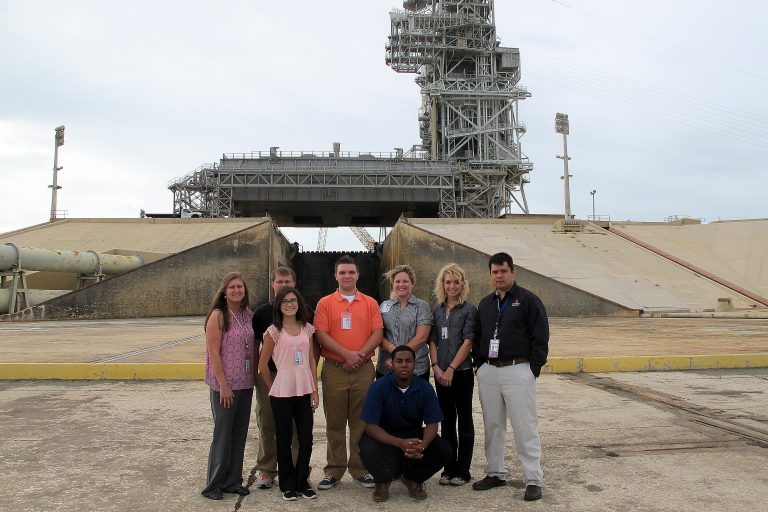By Donna Thornton/News Editor
An excited group of Gadsden State students and two instructors headed to Houston Thursday (Nov. 7) to spend time working with NASA scientists as they test the process their team developed for delivering water to hydroponic systems in a zero gravity atmosphere.
This is the second Zero Gravity team at Gadsden State given the opportunity to work with NASA on this type of project.
The first team, which included instructor Audrey Webb and student Steven Martinez, experimented with the way sediments settle out of water in zero gravity conditions to help develop ways to make waste water potable in a setting such as the International Space Station.
The second Zero Gravity team is made up of Martinez, Karen Billingsley, Jacob Morris, Jenny Plimpton, Michele Scarber, Tyler Strong, and Dre Wright. Instructors for the team of students are Dave Hyatt (Civil Engineering Technology) and Webb (Electronic Engineering/Industrial Automation Technology).
This group took the first phase of their project to the Kennedy Space Center in Florida to work on growing plants hydroponically that will create a food source for astronauts. The students worked with NASA officials to combine research, perfect the prototype, and look at ways to successfully grow food on Mars.
The second phase of the project will take place at Johnson Space Flight Center in Houston. While in Houston, the team will work on a project consisting of two components. The first component, an APH Humidity Control Unit, will test the optimal volume and rate of water for priming. The second component of the project is the APH subsystem that will house the science experiments performed within the growth chamber.
“I am impressed that, once again, NASA has accepted our students’ proposal,” Tim Green, dean of technical edu-cation and workforce de-velopment, said. “This is a great opportunity for the students to expand their problem-solving and critical-thinking skills while working with NASA in completing this ex-periment.
Plimpton, Scarber and Billingsley agreed that they’ve been given a great opportunity in working with NASA. It’s something that’s going to look great on a resume, and it is giving them experience working in a working-world environment, where external variables can intrude upon an experiment – as the temporary government shut-down intruded on theirs.
While no one told the students to stop work on their project, all the federally employed mentors and consultants were off the job for about two weeks, Martinez said.
When their partners were back to work, he said, they had to continue, without an extension of any project deadlines, despite the delays the shutdown caused.
But their work came together smoothly. Webb said their experiment left for Houston three days before the team would.





